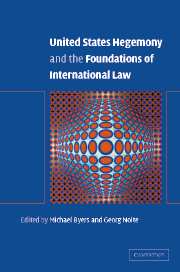Book contents
- Frontmatter
- Contents
- List of contributors
- Preface
- Introduction: the complexities of foundational change
- PART I International community
- PART II Sovereign equality
- PART III Use of force
- PART IV Customary international law
- PART V Law of treaties
- PART VI Compliance
- 16 The impact on international law of US noncompliance
- 17 Compliance: multilateral achievements and predominant powers
- 18 Comments on chapters 16 and 17
- Conclusion
- Index
18 - Comments on chapters 16 and 17
Published online by Cambridge University Press: 13 July 2009
- Frontmatter
- Contents
- List of contributors
- Preface
- Introduction: the complexities of foundational change
- PART I International community
- PART II Sovereign equality
- PART III Use of force
- PART IV Customary international law
- PART V Law of treaties
- PART VI Compliance
- 16 The impact on international law of US noncompliance
- 17 Compliance: multilateral achievements and predominant powers
- 18 Comments on chapters 16 and 17
- Conclusion
- Index
Summary
Vaughan Lowe
As we approach the question of the effects of US predominance on the foundations of international law, I am still troubled by the premises on which we are working. I am not convinced that we have a clear understanding of what we mean by “the United States.” The United States is not a monolithic structure. Different branches, and different levels, of US government have different interests, and act differently. We need also to consider the non-governmental aspects of the issue. US companies are international actors. They conclude bilateral agreements with States in the form of concessions, they compromise arbitration cases, and so on: they are making customary international law in much the same way that States do. The way in which US publishing operates has a profound influence on what we think customary international law is. We have not even begun to discuss the implications of these “private” aspects of the issue.
Nor have we arrived at a clear understanding of what kind of predominance we are looking at. The United States is predominant in Afghanistan. That is a predominance of presence. But if you spoke about US predominance in relation to, say, Rwanda a few years ago, it would have been the predominance of the powerful but absent father. Those are two very different kinds of influence on the international system.
- Type
- Chapter
- Information
- United States Hegemony and the Foundations of International Law , pp. 477 - 490Publisher: Cambridge University PressPrint publication year: 2003
- 1
- Cited by



